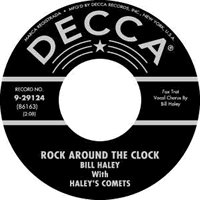So Long And Thanks For The Memories
Norman Lebrecht on demise of Chiswick based record label Decca
|
It’s not often that a record label scores a number one hit and shuts down in the same week, so shed a tear for Decca. Barring a last-minute change of heart, the Chiswick based music icon is going to be wiped off the map before Valentine’s Day writes acclaimed music commentator Norman Lebrecht in his weekly column for La Scena Musicale
The number one Decca hit is Julia Fischer’s debut, a performance of the Bach violin concertos with the Academy of St Martin in the Fields. However, Fischer’s success is almost certain to be Decca’s last.
Lebrecht writes, Decca is a British brand, a piece of bedrock heritage that our forefathers took into the First War trenches and danced to in the Depression years when Bing Crosby, Stephane Grapelli and Louis Armstrong were its stalwarts. Vera Lynne sang the nation through the Second War on Decca, after which a demobbed crew of submarine warriors applied their radar skills to producing the clearest sound anyone had ever heard on record. Decca introduced stereo, the LP and digital recording. It blazed a trail through an industry run by lazy lunchers and stuffed shirts. It may have turned down the Beatles, but it launched the Rolling Stones.
The label lost its way and its hold on the pop charts and in 1980 was sold to a European group that owned its classical rivals Deutsche Grammophon (DG) and Philips. That formation, known as PolyGram, was absorbed into a multinational combine, Universal, operating out of Hollywood and New York. Decca thrived, with the 1990 Three Tenors concert turning into the top-selling classical album of all time. But its stars were aging and, once Georg Solti and Pavarotti were gone, the Universal desk-jockeys began flicking paperclips at its structure.
Three years ago, Roberts appointed the subservient Bogdan Roscic as head of Decca and gave the label a predominantly crossover role, while keeping DG for classics. But if crossover was to convince the grannies that it was a cultural product, it needed a DG imprimatur. Once Ronan Keating joined Elvis Costello and Sting among the ‘classical’ elite, followed by barrel-scrapings from television talent shows, Decca was left without an identity card, shivering in recessional snow.
Roscic had little to show for his three years other than a failed venture in live concert streaming and the signature three months ago of Julia Fischer, a promising violinist on a small Dutch outlet. When Roscic heard that Roberts was planning to scrap Decca, he jumped ship last week to long-dormant Sony Classical, where he has been given a grand title but not much of a budget.
The handful of staff who remain in Decca’s Chiswick offices are waiting for the chop. They expect to be told before the week is out that Decca is history, thanks for the memory.
In times like these when household names are vanishing daily, the loss of a record label hardly qualifies for national mourning. But the abolition of Decca is more than just another colophon going to the wall. Decca represented something to artists and record buyers. It was the one label that scorned star power, sending tyrants like Herbert von Karajan into shock when producers and engineers refused to obey his orders. Decca was also a sound to remember, an uncluttered clarity: home-made, high-tech and unfailingly discreet, a sound that never played ping-pong with your ears.
Still, no point waxing nostalgic. Lots of firms are going to the wall, taking their traditions to oblivion. Decca joins a long queue at the morgue. The regret is that what dies with Decca is more than just a label – it is the very concept of label as a mark of character, a name that united artists and listeners in the search for a particular quality. The idea of label defined the record industry. It is the strategic antithesis of sterile agglomerates like Universal.
Without labels, artists spin off to Starbucks, listeners lose interest and the remnants of the record business go rummaging in dumpbins. Even a number-one classical hit barely shifts 500 copies a week, not enough to support an executive’s pension fund. It’s the end of the line for Decca, the last waltz in a bare-walled studio of dreams.
Norman Lebrecht is one of the most widely-read commentators on music, culture and politics. His Wednesday column in the Evening Standard and on www.scena.org has been described as 'required reading' and is reprinted in journals from Norway to China.
He is a regular presenter on BBC Radio 3 and a contributor to Bloomberg. His many books - which include The Maestro Myth, When the Music Stops, Mahler Remembered and The Life and Death of Classical Music - have been translated into 17 languages.
His first novel, The Song of Names, won the Whitbread Award in 2003 and is due to be made into an international movie. A further novel is scheduled to appear early in 2009.
February 5, 2009
